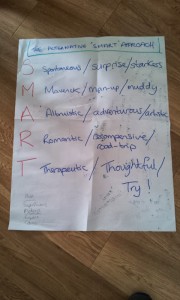How do you make plans?
Setting goals – and planning for how to achieve them – is important. So important that there are books and courses and gurus and people on the internet who will scream at you telling you how to do it. “My way is the best!” “Fail at failing!!” “No Credit Card Required!!!”
I’m going to be one of those people today. I’m not going to ask you for any money but I am going to tell you that what I’m describing is the best. Time after time over the years I have just seen it work. I’ve seen people who couldn’t get a thing done turn around their productivity, just by remembering five words when it came to setting their goals.
These people had learned what it was to be SMART.
What is SMART?
A good goal – a great goal – is Specific: it clearly says what it is that you’re trying to achieve. What the end point is. The output or the outcome. This goal needs to be something Measurable: you need to be able to point to an outcome from your actions and say “I’m finished, and I can show you!” There is something definite that you can demonstrate.
Very often people find themselves losing their way with their goals because they just seem like things to do. “I just have to do it. I have no choice.” If you can clearly find what the Advantage is in completing the goal – you have information, you help someone, you’re a step closer to completing your thesis – then you’ll be much more motivated to do it.
Whatever your goal, it’s important to make sure that it is Realistic. Can you actually do it? Is it possible within the laws of the universe – and more importantly your work-life balance? If you can’t then you have to make some changes to the goal, or possibly to other circumstances. The final word for SMART goals is Time-bound: you have to have a stopping point. A goal, a project, an objective must have a deadline. You have to be able to stop and say “It’s done! What’s next?” or “It’s not done! What’s next?” If all you do is just keep going and keep going, then you will just become frustrated with the task.
I think SMART goals work because they provide five clear conditions which create goals that you can not only work towards, but which require no more information. You might have to plan, you might have to think – and you’ll certainly have to work – but you don’t need any more information about the thing that you are trying to achieve (the hoped-for end state). That’s all done.
It may be that you’re reading about SMART for the first or 50th time and think “Ugh, not for me,” and that’s OK: the important thing is to have SOMETHING. Something more concrete than an ever-expanding to do list. Let me leave you today with a provocation and then a question: a few years ago I was at a residential workshop and when goal-setting the participants came up with their own words for SMART:

My question is: what criteria do you want to use to set your amazing goals?
Thanks for reading!
Nathan (@DrRyder and @VivaSurvivors)

2 replies on “SMART – Setting Great Goals”
[…] can use INTRO to start a talk or think through your work, set objectives with SMART and use 5W1H to dig into problems. DRC is a simple process for generating ideas and PMI […]
[…] all about looking back, it’s about thinking and planning ahead too. I’ve written about setting objectives and goals before, so I’ll try and follow my own advice when it comes to thinking about my […]